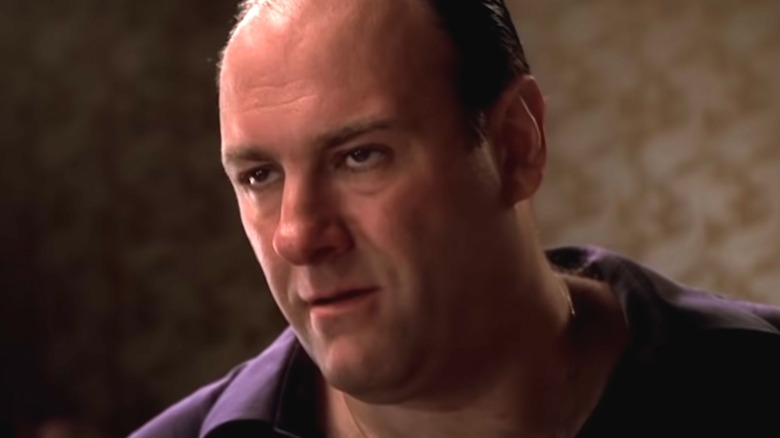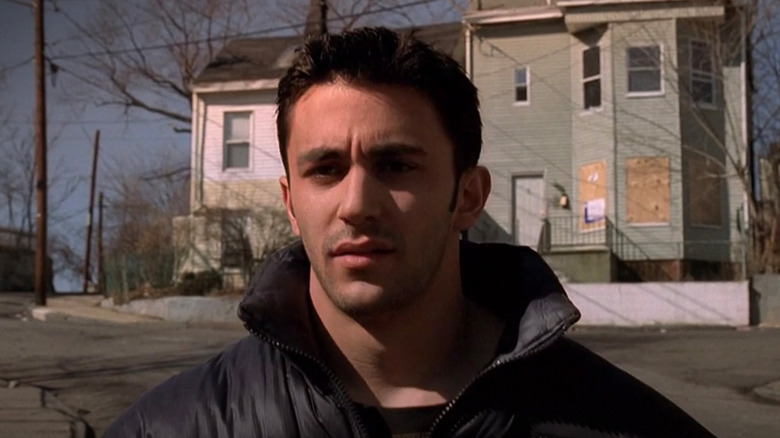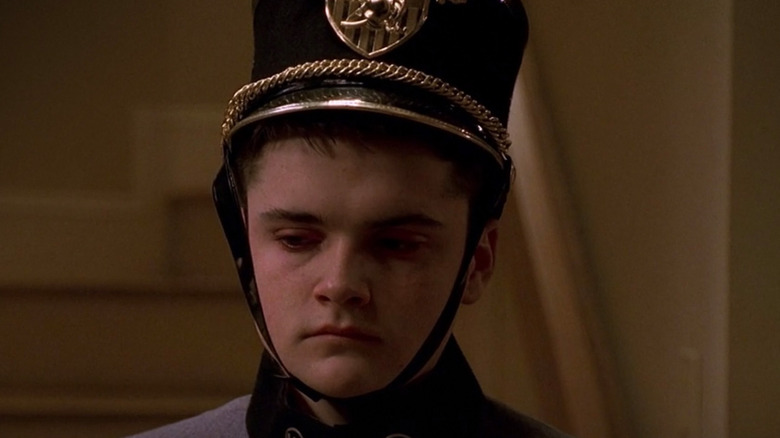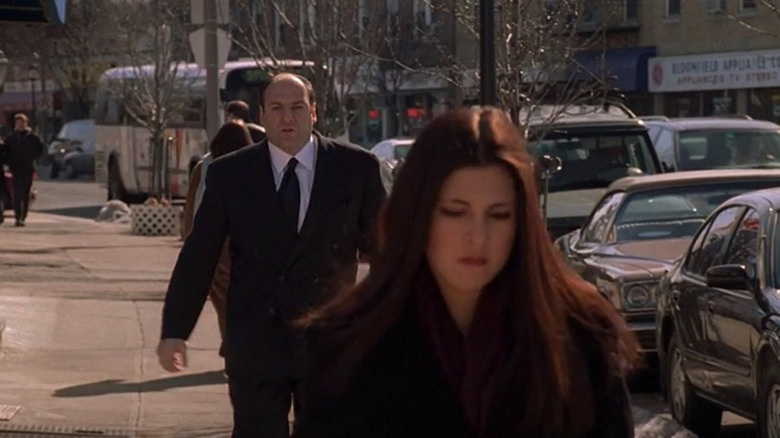The Ending Of The Sopranos Season 3 Explained
Season 3 of David Chase's seminal HBO mob drama "The Sopranos" aired between March and May 2001. By this point in the series, mobster and patriarch Tony Soprano (James Gandolfini) has been promoted from capo to full-blown mob boss. However, being the top dog isn't all it's cracked up to be. Tony and his crew were just forced to kill off their capo and lifelong friend Salvatore "Big P*ssy" Bonpensiero (Vincent Pastore) at the end of Season 2, and during Season 3 even more of Tony's crew are questioning their loyalties. Tony's new captain Ralph Cifaretto (Joe Pantoliano) emerges as a dangerous and unpredictable element, and Paulie Walnuts (Tony Sirico) considers switching to a rival family. All of this is going on while the FBI is trying to wiretap a lamp in Tony's basement.
In Tony's personal life, Season 3 spends considerable time on his relationship with his children. Meadow (Jamie-Lynn Sigler) is attending New York University and beginning to question her upbringing and everything her family stands for. She also briefly dates Noah (Patrick Tully), whom Tony doesn't approve of, before falling in love with Jackie Aprile Jr. (Jason Cerbone), the son of Tony's former boss. Tony would ordinarily be thrilled, but Jackie choices make that difficult–more on them below. Meanwhile, A.J. Soprano (Robert Iler), is struggling through high school and often getting into trouble, but not in the "young enterprising criminal" sort of way like his father used to. Throughout Season 3, Tony struggles with disappointment over his son.
At the end of Season 3, all of Tony's problems come to a head. Here's what the ending of "The Sopranos" Season 3 is all about.
Jackie Jr.'s death is Tony's failure, on multiple levels
The Season 3 finale, "Army of One," is the episode in which Jackie Aprile Jr. is killed. To briefly recap, Jackie was just beginning his life of crime. When Tony was Jackie's age, he successfully robbed a made man's poker game, making an early name for himself. Inspired, Jackie wanted to do the same. However, in the penultimate episode of Season 3, Jackie's own attempted poker game stickup went wrong when Jackie murdered the dealer. It was Ralphie's game, and in the Season 3 finale, Ralphie has no choice but to order Jackie's death.
It's a devastating moment for everyone in Tony's orbit, but it's also a typical "Sopranos" death. Tony and his associates all have to come up with a cover story for Jackie's shooting–they claim drug dealers are responsible–and pretend like they don't know anything more. Living this kind of life requires constant lying, to each other but also to themselves.
Tony had promised Jackie Aprile Sr. that he would look out for his son. Now, not only has Tony failed his old boss, he's failed his old boss' son, too. Yet Tony never outwardly shows any sense of responsibility for his role in Jackie's death. To Carmela (Edie Falco) and the kids, he repeats the drug dealer story and writes off Jackie as a failure. It's fair to wonder whether he's also lying to himself.
Tony was very much a father figure to Jackie. So, his failure with Jackie has disturbing implications for his relationships with A.J. and Meadow.
Like father like son, whether you like it or not
To say that Tony's relationship with his only son is complicated would be an understatement. For all of A.J.'s life, Tony has tried to be a more sensitive and nurturing father to A.J. than his own father was to him. Unlike Tony's father, Tony isn't actively grooming his son to join the mafia. He wants something different for A.J. Yet Tony very much does want his son to be like him–at least in terms of Tony's positive qualities. He wants his son to be disciplined and to respect authority, to be successful, and to make him proud. Tony always saw little of himself in his son, but that changes here.
In the Season 3 finale, A.J. gets expelled from school. Tony is infuriated, not so much because his son got in trouble, but because his son got caught. Sure, Tony got in trouble in school too, but his schemes usually involved making money off his classmates. A.J. is just a troublemaker. Later in the episode, Tony takes the drastic measure of threatening to put A.J. in a military school, where A.J. can learn that discipline and respect that Tony thinks he lacks. Military school is about the least mafia-like institution possible, but Tony is desperate to mold his son into something resembling himself.
This is the exact moment when Tony reveals how wrong he is. While putting on in his military school uniform, A.J. has a panic attack–just like Tony has panic attacks. Tony backs down from his military school threat. Later, he laments to Dr. Melfi that his son inherited his "putrid gene." Tony realizes that A.J. is much more like him than he thought, but not in the way he wanted.
The emptiness of Junior's song
To cap off Season 3, everyone gathers for Jackie Jr's. funeral. At the wake, Uncle Junior (Dominic Chianese) sings a soulful rendition of the 1911 song "Core 'ngrato," all in Italian. The song title translates to "Ungrateful Heart," and the song itself is a sad ballad about unrequited love. It seems like a beautiful moment that brings the characters together after a difficult season, until you remember what actually brought them together: Jackie Jr.'s death. At the funeral, everyone is acting like Jackie's death was a random tragedy. In fact, it was a direct result of the lifestyle they all live, and some of them are even responsible.
A drunken Meadow (Jamie-Lynn Sigler) is the only one present who feels outraged by the collective hypocrisy. This is why she begins mockingly throwing pieces of bread at her great uncle during the song. Tony chases her out of the restaurant and tries to confront her, only to watch her run away–another moment when Tony fails the next generation.
At the very end of the episode, Junior's audio drops out, and the show replaces it with a French-language version of the song, then a Chinese version, and finally a Spanish version. To the people in attendance, the song is just a beautiful piece of music. It doesn't matter what it's really about. Similarly, the funeral is just a party, a chance to eat free food and talk business. Conveniently, everyone can ignore why they're all really there–and their own responsibility for Jackie's Jr.'s death.
"The Sopranos" has always been honest about the fact that being a mobster requires living a life of lies. At the end of Season 3, almost every character participates in the lie that binds them all together.



